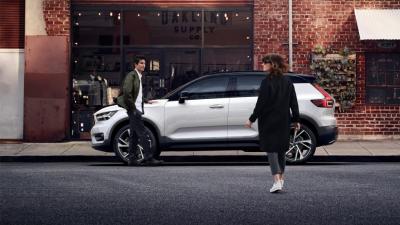Four-figure down payments, cumbersome lease lengths, and skyrocketing insurance costs: it’s enough to send a would-be car shopper running for an Uber or Lyft.
That’s why more automakers are rolling out flat-fee programs that aim to make leasing a car as simple as buying a smartphone. In a bid to keep potential customers from defecting to ride-hailing services and foregoing personal car ownership, brands like Volvo, Cadillac, and Porsche are upending the traditional retail model by developing app-based monthly subscription services that provide vehicles on demand.
When Volvo’s new XC40 SUV arrives at dealerships this spring, subscribers to the brand’s new Care by Volvo program will pay a minimum of $600 a month– depending on the trim level–for a package that includes maintenance, insurance, and 15,000 miles annually. They can switch to a new Volvo after a year or renew their lease for up to two more years. Taxes, gas, and registration fees are not included.
“We are seeing a new way of having a car,” says Volvo President and CEO Håkan Samuelsson. “That’s why we’re offering a flat rate independently of your age or where you live. People living in big cities normally pay a very high insurance fee.”
Subscription models, which provide more flexibility than a typical long-term lease, may give automakers a leg up in a retail landscape increasingly shaped by ride-hailing services. In the short-term, automakers are hoping the new services will generate more business as the post-recession sales surge tapers. In 2017, the industry reported the first decline in new vehicles sales in eight years.
Ultimately, subscription models could prime consumers to expect greater variety. Why should they stick to the same set of wheels when they actually need an all-wheel-drive SUV for winter, a convertible for summer, and a pickup truck on moving day? This could speed the march toward the mobility-as-a-service model, where people only pay for the transportation they use.
Available in New York, Dallas, and Los Angeles, BOOK by Cadillac lets subscribers rent different cars up to 18 times a year, starting at $1,800 per month plus a $500 initiation fee. They also get full access to the automaker’s lineup of sports cars, sedans, and SUVs, as well as a “white-glove concierge service” that delivers and retrieves the vehicles at a time and place the subscriber sets through the program’s app. Users can keep the vehicle for up to 30 days, with an option to renew, and are allowed 2,000 miles per month. Between loans, the concierge service stores the unused vehicles on its lot and handles maintenance and detailing for the next user.
In some cases, a subscription service’s annual costs could exceed the cost of actually owning a car, but automakers say users pay a premium for the convenience and variety. However, an Edmunds analysis found that BOOK by Cadillac could cost users less than they would pay for a traditional lease, depending on the vehicle. The firm estimates that leasing and insuring a 2017 Cadillac Escalade SUV with similar mileage restrictions would cost an additional $75 over the monthly subscription fee and that renting a sports car like the Cadillac ATS for a weekend would run an extra $150 daily.
The Porsche Passport program, which starts at $2,000 a month, allows customers in Atlanta to sample up to 22 different models in its portfolio. Members can request cars using an app designed by Clutch Technologies, Porsche’s Atlanta-based technology partner that also handles delivery. The average turnaround time is about two hours, and users can swap vehicles as often as they want. The cars are stored at a facility in Metro Atlanta when they’re not rented to subscribers. Service and maintenance are taken care of by two local Porsche dealerships.
Klaus Zellmer, president and chief executive of Porsche Cars North America, says the program could appeal to parents who need an SUV during the week but want a sports car for the weekend, or to a Hollywood director in town for a three-month shoot. “Through Porsche Passport we look to welcome new customers to our brand,” Zellmer says. “We want to attract members who are constantly on the go, or perhaps have relocated to Atlanta for short periods of time.”
Meanwhile, Lincoln will pilot a subscription service in California later this year, and Mercedes-Benz and BMW are considering their own programs. But as long as consumers still pay for private vehicles, transitioning to a subscription sales model is likely to have little immediate impact on how our cities look, says Gabe Klein, cofounder of CityFi, an urban advisory services firm, and the former Commissioner of Chicago and Washington, D.C.’s departments of transportation. Eventually, automakers will sell fewer private vehicles as shared, autonomous cars take hold, leading to less traffic and new life for land currently used as parking lots.
“Right now, it’s just a different financial model,” Klein said. “Until you give up the monthly payment, you’re not really giving up ownership.”
Source: Jaclyn Trop a Los Angeles-based freelance reporter covering cars || March 05, 2018 |||




